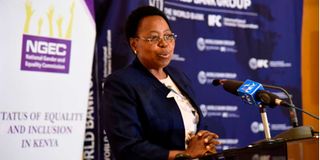NGEC spells out path to a gender equal future in Kenya

NGEC Chairperson Dr Joyce Mutinda during the "Inclusion Matters in Africa" book launch at a Nairobi hotel in February last year.
What you need to know:
- NGEC has come up with recommendations of what needs to be done to accelerate the realisation of a ‘gender-equal future’ and women leadership in the country.
- Agency wants the government and the private sector to increase resource allocation for gender equality programs and communities and socialisation agents to promote a positive attitude towards women and girl’s autonomy.
The National Gender and Equality Commission (NGEC) has come up with recommendations of what needs to be done to accelerate the realisation of a ‘gender-equal future’ and women leadership in the country.
The move by the commission comes as the country continues to grapple with gender in-equality that has largely disadvantaged women.
NGEC in a statement to celebrate the International Women’s Day that was marked recently, spelt out interventions they think will help bridge the gender in-equality gap in the country.
The theme for this year’s International Women’s Day was: “Women in leadership: Achieving an equal future in a Covid-19 world,” with the campaign message ‘choose to challenge’.
NGEC chairperson Dr Joyce Mutinda recommended that women leadership spaces and opportunities in both county and national government and the private sector, be protected and promoted in the ongoing constitutional reform agenda.
The commission has also recommended that all actors support a coordinated effort towards the implementation of the Sessional Paper No. 02 of 2019 on National Policy on Gender and Development.
Beijing Platform for Action
The sessional paper draws policy issues that Kenya must implement to realise gender equality and women empowerment along the 12 critical areas identified in the 1995 Beijing Platform for Action; “All duty bearers to comply with the constitutional provisions on gender equality and freedom from discrimination, and with international and regional commitments that Kenya has ratified on women rights,” NGEC statement reads in part.
The agency also wants the government and the private sector to increase resource allocation for gender equality programs and communities and socialisation agents to promote a positive attitude towards women and girl’s autonomy.
It has also challenged women as right holders to claim and exercise their rights including presenting themselves for opportunities available in governance, labour, education, manufacturing, blue economy, leadership, among other sectors.
Dr Mutinda noted the journey towards leadership and fair representation of women in the socio-economic and political spheres dates back to the colonial period when the Maendeleo Ya Wanawake movement, a national grassroots movement, was registered in 1952.
She added since then, there have been several initiatives to promote the inclusion, participation and representation of women in various sectors which have yielded some gains.
The chairperson also noted the push for gender equality and women inclusion in Kenya took a turn for the better in 2010 after the promulgation of the New Constitution of Kenya 2010 and national commitment to 2015 Sustainable Development Goals (SDGs).
Economic opportunities
The 2010 constitution in particular underscores women representation in elective and appointive positions by creating a minimum threshold under the two- thirds gender rule’.
The creation of devolved governments in the Constitution opened several other entry points for women leadership in the County Governments.
The NGEC official added that although the minimum-set threshold of representation and participation of women at the national level is yet to be realised, significant progress has been made.
“In politics, for instance, women representation in the 1990s was three per cent. This number increased in 2019 to 31.3 per cent in the Senate and 22 per cent in the National Assembly. In the Judiciary, women magistrates constitute 53.3 per cent,” she said.
On economic opportunities and participation for women, Dr Mutinda said Kenya like many other developing countries suffers from extreme levels of gender inequalities and discrimination in the labour sector.
She added the fact that women are persistently fewer in the labour market contributes to the economic participation and opportunity gap. She further noted that within the labour market, gender gaps tend to widen with seniority level.
An analysis of the gender mainstreaming reports for the year 2019/2020, which the commission received from government ministries, departments and agencies show that men are dominant in the senior management positions.





